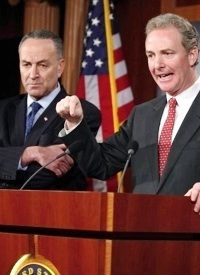
There is nothing sadder than witnessing a populace that truly believes in the sincerity of their elected officials as it gets trampled by the corruption of the same group of people in whom it has placed its trust. This scenario continues to play out each day as lawmakers forego any of the alleged genuine intentions of the DISCLOSE Act (Democracy is strengthened by Casting Light on Spending in Elections Act) to gain support and assure its passage.
Authors of the DISCLOSE Act claim it will increase transparency by forcing large organizations that finance campaigns to either disclose all donors of $1,000 or more or set up a campaign account and disclose all donors who transfer $10,000 or more into that account.
Supporters initially voiced their support for the act, defending its necessity by citing the Supreme Court’s decision in Citizens United, which allegedly strengthens “corporations’ grip on our government and political process.” According to discloseact.com, the purpose of the act was to “rein in the increased influence of special interest money.”
Unfortunately, the exact opposite is unfolding and, instead of reining in special interests’ influence, the act is increasing it drastically.
And instead of solving the problem of influential lobbyists, the DISCLOSE Act creates further problems by encroaching upon First Amendment rights by potentially allowing the FEC to regulate political speech on the Internet. Conservative website Hot Air explains that the bill does not exempt bloggers, only major media outlets, and as such, “could be used to harass smaller, unfunded bloggers out of the realm of political debate.” Likewise, the law should not “discriminate between two similar corporations producing similar intellectual property simply on the basis of product when it comes to free speech.”
Last week, I wrote an article discussing the role that the National Rifle Association is playing in the passage of the DISCLOSE Act. In order for lawmakers to gain the support of the NRA, they carved out an exemption for the gun group into the legislation itself, invoking the support of the NRA. In doing so, the NRA has now been dubbed a “sell-out” for ultimately making a deal with Congress that says “we will stand by while you trample on First Amendment rights as long as you leave our Second Amendment rights alone.”
The exemption did not only provoke anger toward the NRA from its supporters, but from groups on both the Right and the Left who either see the bill as detrimental to First Amendment rights or those groups who feel indignant that they too did not receive exemptions.
Among the oppositional groups are the Congressional Black Caucus (CBC), who fear the effects of the bill on the NAACP and other civil rights groups, and the conservative Blue Dog Democrats, who argue that the bill will cause them to lose the votes of business lobbyists.
Because of staunch criticism on both sides of the aisle, House Speaker Nancy Pelosi pulled the bill from the House floor on Thursday June 17, preventing the originally scheduled Friday vote.
In order to assuage the opposition, Democratic Representative Chris Van Hollen expanded the exemption for groups with more than one million members to those with more than 500,000. Defending his decision, Van Hollen remarks, “The key thing is to get this bill passed. Because even with the changes, this will be a historic amount of disclosure.”
He adds that the prime purpose of the act was to force transparency in “groups that pop up overnight with shadowy names … and don’t have to disclose who their donors are. We are less worried about groups with dues-paying members.”
In other words, smaller groups are the ones being targeted, while the larger, and more influential groups, are given a free pass. Isn’t that a direct contradiction of the bill’s supposed goal?
Forty-five liberal nonprofit groups addressed this very concern in a letter to Pelosi: “It is inappropriate and inequitable to create a two-tiered system of campaign finance laws and First Amendment protections, one for the most powerful and influential and another for everyone else. There is no legitimate justification for privileging the speech of large entities, or of reducing the burdens of compliance for the largest organizations yet retaining them for the smallest.”
Senate Majority Leader Harry Reid continues to articulate his support for the campaign finance reform bill and pledges the support of 50 sponsors. In a letter to Pelosi, Reid and Senate Rules Committee Chair Chuck Schumer agreed to work on the bill once it is passed by the House “so it can be signed by the President in time to take effect for the 2010 elections.”
Reid and Schumer appear confident, even as the Chamber of Commerce is fully prepared to run a campaign against the passage of the act. Reid assured Schumer and Van Hollen that he would be able to bring the bill to the floor for a vote, but has yet to provide a specific timetable. Congress is only in session for another week before the July 4 recess and will return for a short time before the August recess, providing Pelosi with a limited amount of time to muster up support for this highly unpopular bill.
Read also: "Loophole Backfires, Blows up DISCLOSE Act."
Photo: Rep. Chris Van Hollen (D-Md.), right, accompanied by Sen. Charles Schumer (D-N.Y.) gestures during a news conference on Capitol Hill, Feb. 11, 2010, to discuss the introduction of a bill to undo the Supreme Court’s Citizens United ruling.: AP Images




